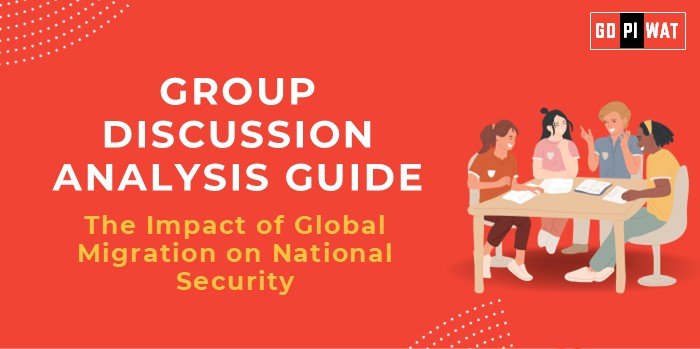📋 Group Discussion (GD) Analysis Guide
🌐 The Impact of Global Migration on National Security
📖 Introduction to the Topic
Opening Context: “Global migration is a defining challenge and opportunity of the 21st century, affecting economies, cultures, and security frameworks worldwide.”
Topic Background: Global migration has surged due to economic disparities, political instability, and environmental changes. Nations face both benefits, such as skilled labor inflow, and challenges, including heightened security risks from illegal migration and terrorism.
📊 Quick Facts and Key Statistics
- 🌍 Global Migrant Population: 281 million (2020) – 3.6% of the world’s population.
- 🚨 Displacement Due to Conflict: 43.3 million displaced globally by conflict in 2022 (UNHCR).
- 💰 Economic Contributions: Migrants contributed $6.7 trillion to global GDP in 2021 (OECD).
- 🛂 Illegal Border Crossings: 330,000 attempts into the EU in 2022, the highest since 2016 (Frontex).
🌟 Stakeholders and Their Roles
- 🏦 National Governments: Secure borders, enact immigration policies, and ensure national security.
- 🏛️ International Organizations: UNHCR and IOM manage refugee crises and coordinate humanitarian aid.
- 🏢 Private Sector: Provides jobs for migrants; assists in integration programs.
- 🤝 Citizens and NGOs: Influence policy through advocacy and community-based support initiatives.
🏆 Achievements and Challenges
✨ Achievements
- 💡 Strengthened Economies: Skilled migrants contribute significantly (e.g., US and tech sectors).
- 🌍 Successful Integration Programs: Countries like Canada and Germany demonstrate effective integration.
- 🌐 Enhanced Cooperation: International efforts on border security (e.g., Schengen reforms).
⚠️ Challenges
- 🚨 Terrorism and Radicalization: Instances of terror cells linked to migration routes.
- ⚖️ Illegal Migration: Strains public resources and challenges law enforcement.
- 🤔 Social Integration: Xenophobia and cultural clashes in host nations.
📘 Global Comparisons:
– Successes: Canada emphasizes skilled labor in its immigration system.
– Failures: The EU struggles with asylum applications due to uneven burden sharing.
– Case Study: The Syrian refugee crisis and its security implications for Europe.
💬 Structured Arguments for Discussion
- ✅ Supporting Stance: “Migration enhances cultural diversity and addresses labor shortages, critical for economic growth.”
- ❌ Opposing Stance: “Unregulated migration risks overburdening resources and increasing security threats.”
- ⚖️ Balanced Perspective: “While migration has substantial benefits, security concerns necessitate robust policies and international collaboration.”
💡 Effective Discussion Approaches
- 🌏 Opening Approaches:
- “The influx of over 1 million Syrian refugees into Europe highlights both the humanitarian aspect and the security risks of migration.”
- “Did you know migrants contribute $6.7 trillion to the global GDP annually, yet illegal migration remains a top concern for national security?”
- 🤔 Counter-Argument Handling:
- Challenge: “Illegal crossings peaked at 330,000 in 2022.”
Response: “Regulated pathways have proven effective, as seen in Canada.” - Challenge: “Migration raises risks of radicalization.”
Response: “Balanced integration policies can mitigate these risks, as seen in Germany.”
- Challenge: “Illegal crossings peaked at 330,000 in 2022.”
🔍 Strategic Analysis of Strengths and Weaknesses
- 💪 Strengths: Economic growth, cultural exchange, innovation from skilled migrants.
- ⚖️ Weaknesses: Infrastructure strain, potential for unregulated migration to disrupt security.
- 📈 Opportunities: Use AI for border security, bilateral agreements for migrant integration.
- ⚠️ Threats: Rising xenophobia, political polarization, misuse of migration by terror groups.
🎓 Connecting with B-School Applications
- 🌍 Real-World Applications: Operations and logistics for refugee management, ethical policymaking in global settings.
- 💬 Sample Interview Questions:
- “How can technology be leveraged to manage migration effectively?”
- “Discuss the economic and security trade-offs of liberal migration policies.”
- 💡 Insights for Students:
- Research on the intersection of economic development and security policy.
- Understand the role of financial markets during migration crises.


